Store may refer to:
Store may refer to:
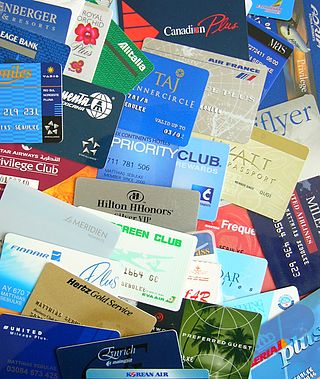
A loyalty program or a rewards program is a marketing strategy designed to encourage customers to continue to shop at or use the services of one or more businesses associated with the program.
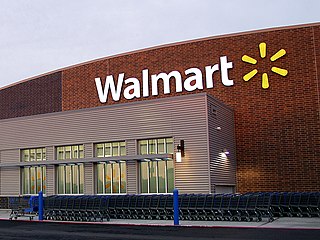
A supermarket is a self-service shop offering a wide variety of food, beverages and household products, organized into sections. This kind of store is larger and has a wider selection than earlier grocery stores, but is smaller and more limited in the range of merchandise than a hypermarket or big-box market. In everyday United States usage, however, "grocery store" is often used to mean "supermarket".
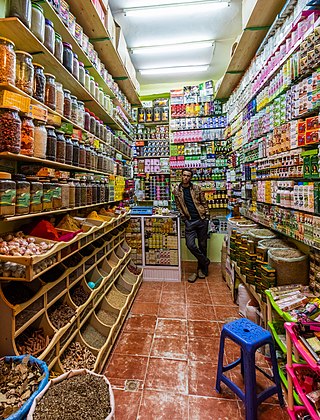
Retail is the sale of goods and services to consumers, in contrast to wholesaling, which is the sale to business or institutional customers. A retailer purchases goods in large quantities from manufacturers, directly or through a wholesaler, and then sells in smaller quantities to consumers for a profit. Retailers are the final link in the supply chain from producers to consumers.

A variety store is a retail store that sells general merchandise, such as apparel, auto parts, dry goods, toys, hardware, furniture, and a selection of groceries. It usually sells them at discounted prices, sometimes at one or several fixed price points, such as one dollar, or historically, five and ten cents. Variety stores, as a category, are different from general merchandise superstores, hypermarkets, warehouse clubs, grocery stores, or department stores.

Costco Wholesale Corporation is an American multinational corporation which operates a chain of membership-only big-box warehouse club retail stores. As of 2021, Costco is the third-largest retailer in the world and is the world's largest retailer of choice and prime beef, organic foods, rotisserie chicken, and wine as of 2016. Costco is ranked #11 on the Fortune 500 rankings of the largest United States corporations by total revenue. Costco uses a club warehouse wholesale retailer channel of distribution while also selling their private label brand directly to consumers.
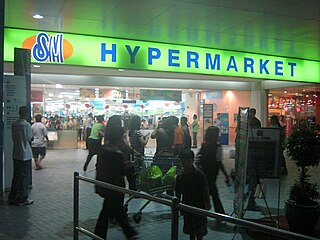
A hypermarket or superstore is a big-box store combining a supermarket and a department store. The result is an expansive retail facility carrying a wide range of products under one roof, including full grocery lines and general merchandise. In theory, hypermarkets allow customers to satisfy all their routine shopping needs in one trip. The term hypermarket was coined in 1968 by French trade expert Jacques Pictet.
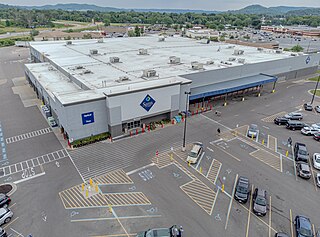
Sam's West, Inc. is an American chain of membership-only warehouse club retail stores owned and operated by Walmart Inc., founded in 1983 and named after Walmart founder Sam Walton as Sam's Wholesale Club. As of January 31, 2019, Sam's Club ranks second in sales volume among warehouse clubs with $84.3 billion in sales, behind its main rival Costco Wholesale.

Online shopping is a form of electronic commerce which allows consumers to directly buy goods or services from a seller over the Internet using a web browser or a mobile app. Consumers find a product of interest by visiting the website of the retailer directly or by searching among alternative vendors using a shopping search engine, which displays the same product's availability and pricing at different e-retailers. As of 2020, customers can shop online using a range of different computers and devices, including desktop computers, laptops, tablet computers and smartphones.

A warehouse club is a retail store, usually selling a wide variety of merchandise, in which customers may buy large, wholesale quantities of the store's products, which makes these clubs attractive to both bargain hunters and small business owners. The clubs are able to keep prices low due to the no-frills format of the stores. They are distinguished from traditional cash-and-carry wholesale businesses in that their warehouses are substantially larger in size, and they do not cater purely to businesses but also allow some or all types of consumers to obtain memberships. They are also distinguished from warehouse stores in that they usually charge annual membership fees, and require presentation of proof of membership at the warehouse entrance and again at the point of sale.

Zayre was a chain of discount stores that operated in the eastern half of the United States from 1956 to 1990. The company's headquarters were in Framingham, Massachusetts. In October 1988, Zayre's parent company, Zayre Corp., sold the stores to the competing Ames Department Stores, Inc. chain. In June 1989, Zayre Corp. merged with one of its subsidiaries, The TJX Companies, parent company of T.J. Maxx, which still exists today. A number of stores retained the Zayre name until 1990, by which time all stores were either closed or converted into Ames stores.
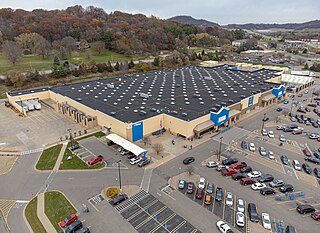
A big-box store, a hyperstore, a supercenter, a superstore, or a megastore is a physically large retail establishment, usually part of a chain of stores. The term sometimes also refers, by extension, to the company that operates the store. The term "big-box" references the typical appearance of buildings occupied by such stores.
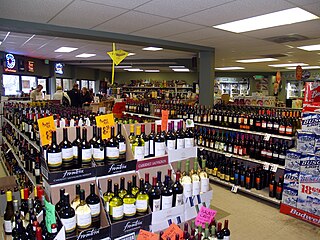
A liquor store is a retail business that predominantly sells prepackaged alcoholic beverages, including liquors, wine or beer, usually intended to be consumed off the store's premises. Depending on region and local idiom, they may also be called an off-licence, off-sale, bottle shop, bottle store or, colloquially, bottle-o, liquor store or other similar terms. A very limited number of jurisdictions have an alcohol monopoly. In US states that are alcoholic beverage control (ABC) states, the term ABC store may be used.

A duty-free shop or store is a retail outlet whose goods are exempt from the payment of certain local or national taxes and duties, on the requirement that the goods will be sold to travelers who will take them out of the country, who will then pay duties and taxes in their destination country. Which products can be sold duty-free vary by jurisdiction, as well as how they can be sold, and the process of calculating the duty or refunding the duty component.

Price Rite is a chain of supermarkets found in Connecticut, Maryland, Massachusetts, New Hampshire, New Jersey, New York, Pennsylvania, and Rhode Island. Based in Keasbey, New Jersey, Price Rite is owned by New Jersey–based Wakefern Food Corporation, the cooperative behind ShopRite Supermarkets, Dearborn Market, and The Fresh Grocer. Prior to 2014, Wakefern owned and operated all Price Rite stores.

A retail park is a type of shopping centre found on the fringes of most large towns and cities in the United Kingdom and other European countries. They form a key aspect of European retail geographies, alongside indoor shopping centres, standalone stores like hypermarkets and more traditional high streets.
Service Merchandise was a retail chain of catalog showrooms carrying jewelry, toys, sporting goods and electronics. The company, which first began in 1934 as a five-and-dime store, was in existence for 68 years before ceasing operations in 2002.

Brick and mortar is an organization or business with a physical presence in a building or other structure. The term brick-and-mortar business is often used to refer to a company that possesses or leases retail shops, factory production facilities, or warehouses for its operations. More specifically, in the jargon of e-commerce businesses in the 2000s, brick-and-mortar businesses are companies that have a physical presence and offer face-to-face customer experiences.

FedMart was a chain of discount department stores started by Sol Price, who later founded Price Club. Originally a discount department store open to government employees paying a $2 per family membership fee, FedMart earned four times more than its investors had projected in its first year. Over the next 20 years, FedMart grew to include 45 stores, mostly in California, and the Southwest in a chain that generated over $300 million in annual sales. The business expanded to several states in the Southwest United States. Many stores were previous White Front or Two Guys locations. Price later sold two-thirds of the chain to Hugo Mann, a German retail chain, in 1975 and was forced out of his leadership position the following year. FedMart went out of business in 1982.

A neighborhood shopping center is an industry term in the United States for a shopping center with 30,000 to 125,000 square feet of gross leasable area, typically anchored by a supermarket and/or large drugstore.
The retail format influences the consumer's store choice and addresses the consumer's expectations. At its most basic level, a retail format is a simple marketplace, that is; a location where goods and services are exchanged. In some parts of the world, the retail sector is still dominated by small family-run stores, but large retail chains are increasingly dominating the sector, because they can exert considerable buying power and pass on the savings in the form of lower prices. Many of these large retail chains also produce their own private labels which compete alongside manufacturer brands. Considerable consolidation of retail stores has changed the retail landscape, transferring power away from wholesalers and into the hands of the large retail chains.